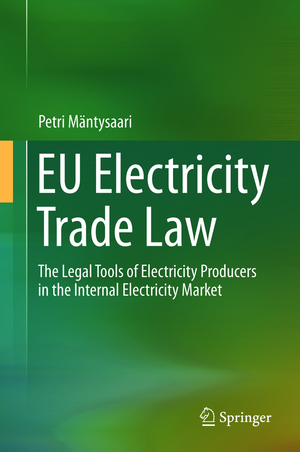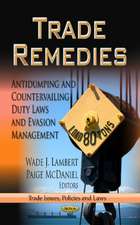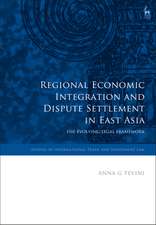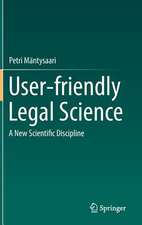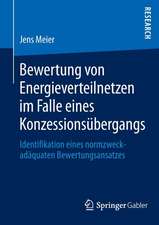EU Electricity Trade Law: The Legal Tools of Electricity Producers in the Internal Electricity Market
Autor Petri Mäntysaarien Limba Engleză Hardback – 22 mai 2015
The target for the completion of the EU’s internal electricity market was 2014. The internal wholesale electricity market is very important not only for electricity producers, suppliers and major end consumers but also for network operators, marketplace operators, electricity technology firms, investment firms and market regulators.
| Toate formatele și edițiile | Preț | Express |
|---|---|---|
| Paperback (1) | 905.98 lei 6-8 săpt. | |
| Springer International Publishing – 9 oct 2016 | 905.98 lei 6-8 săpt. | |
| Hardback (1) | 912.32 lei 6-8 săpt. | |
| Springer International Publishing – 22 mai 2015 | 912.32 lei 6-8 săpt. |
Preț: 912.32 lei
Preț vechi: 1112.59 lei
-18% Nou
Puncte Express: 1368
Preț estimativ în valută:
174.60€ • 181.61$ • 144.14£
174.60€ • 181.61$ • 144.14£
Carte tipărită la comandă
Livrare economică 15-29 aprilie
Preluare comenzi: 021 569.72.76
Specificații
ISBN-13: 9783319165127
ISBN-10: 3319165127
Pagini: 450
Ilustrații: XVII, 614 p.
Dimensiuni: 155 x 235 x 40 mm
Greutate: 1.06 kg
Ediția:2015
Editura: Springer International Publishing
Colecția Springer
Locul publicării:Cham, Switzerland
ISBN-10: 3319165127
Pagini: 450
Ilustrații: XVII, 614 p.
Dimensiuni: 155 x 235 x 40 mm
Greutate: 1.06 kg
Ediția:2015
Editura: Springer International Publishing
Colecția Springer
Locul publicării:Cham, Switzerland
Public țintă
ResearchCuprins
1. Introduction.- Part I General Aspects: 2. Setting the Scene.- 3. Introduction to the Regulation of Electricity Markets.- Part II Marketplaces: 4. Electricity Marketplaces.- 5. Transmission Marketplaces.- 6. Market Coupling.- 7. Electricity Generated from Renewable Sources and Emission Marketplaces.- Part III Physical Contracts: 8. Long-term Electricity Supply Contracts.- 9. Balancing Contracts and Balance Group Contracts.- 10. Transmission Contracts.- Part IV Financial Contracts: 11. Financial Contracts.- 12. Financial Derivatives on Transmission Capacity.
Textul de pe ultima copertă
This book aims to describe the mechanisms of the internal wholesale electricity market in terms of the legal tools and practices used by electricity producers, the most important market participants. In this regard, the focus is on Northwestern Europe. Because of the book’s functional perspective, it is not limited to the external regulation of electricity markets at the EU level and also describes the business models and practices employed by electricity producers. Both the physical and financial marketplaces are examined and topics including electricity supply, balancing, transmission and derivatives are covered.
The target for the completion of the EU’s internal electricity market was 2014. The internal wholesale electricity market is very important not only for electricity producers, suppliers and major end consumers but also for network operators, marketplace operators, electricity technology firms, investment firms and market regulators.
The target for the completion of the EU’s internal electricity market was 2014. The internal wholesale electricity market is very important not only for electricity producers, suppliers and major end consumers but also for network operators, marketplace operators, electricity technology firms, investment firms and market regulators.
Caracteristici
Very important topic for electricity producers, suppliers and major end consumers, network operators, marketplace operators, electricity technology firms, investment firms and market regulators One of the first books on the new internal electricity market Adopts the perspective of the electricity producer, a rarely seen approach in legal research Focuses on what market participants actually do Helps readers to grasp the relevant legal aspects of the internal electricity market and to understand how electricity producers are adapting their business models to accommodate regulatory changes
